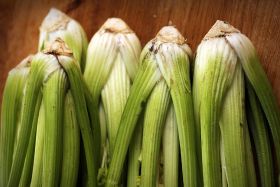
Applying for protected name status for a fresh produce product takes years, but gaining a PGI or PDO label is not a simple ticket to market. Growers have been told to make the most of protected origin status, or risk losing out on the financial benefits it could bring. So what can growers do to reap the rewards of a protected name?
1. Work together to develop a group identity
Form a group with other growers to combine promotion efforts for the same product. The Armagh Bramley apple was awarded PGI status in 2013, but growers were slow to capitalise on the label and suspicious of working with their competition. They have received support from two schemes: a department of agriculture-funded rural development scheme and a local council-backed Armagh Bramley development programme.
Rhonda McDowell, supply chain consultant at RMD solutions, says: “We started off by getting them to work together as a group and fully understand the PGI status and how that can be turned into benefit. We then developed a corporate identity with a new logo and new website.” Alan Montgomery, of the Ulster Farmers Union subsidiary Countryside Services, admits it took a couple of years of “hard effort” to get Armagh growers to collaborate. “Now they are more comfortable with each other and realise they don’t need to be in direct competition,” he says. “Apart from branding and forming a collaborative group, they needed to develop a brand identity by linking to the tourist board, forming a marketing strategy and working with retailers.”
Montgomery also works with growers of the PGI Comber Earlies, in County Down, where he had a similar task. “We finally managed to persuade Comber Early Potato growers to collaborate and discuss opportunities. They are now a legal entity and co-operative, and they’ve grown members from six up to 20.”
2. Establish the market
You can’t capitalise financially on the protected status of your product unless you know exactly what market to target. Whether your market is catering, exports, speciality or commodity products, work out what are the unique selling points of your protected product and establish its primary customers. Matthew O’Callaghan, chair of the UK protected names association and consultant behind the successful PGI brand Melton Mowbray pork pies, believes growers often leave the selling until last. “The thing people think about last after applying for PGI is who you’re going to sell it to, and that’s the wrong way round,” he says. “Armagh apples risk being a commodity product, whereas they need to be a specialty product. The apple has a very unique flavour and the texture is dense, they need to keep these features at the forefront of any promotion.”
Once you have clarified the product’s unique characteristics, identify who is most likely to be interested. If it’s flavour, try the foodie scene, if it’s a unique growing window such as Comber Earlies or Jersey Royals, approach the retailers. Fenland Celery, awarded PGI status in October of last year, has made foodie journalists and bloggers a key part of promotion. Anthony Gardiner, marketing manager for Fenland Celery grower G’s Fresh, explains: “Volumes are small but it’s a hero product. It’s unusual and has a unique flavour. As it’s mainly food-focused activity, we took journalists and chefs into the field in 2012, and this something we will look to do every season going forward.”

3. Partner with the local tourism offering
Fundamentally linked to its local roots, a PGI/PDO product has huge potential for using local tourism opportunities to draw more people into the region and boost the local economy. With food provenance ever increasing in the consumer’s awareness, this is surely one of the most exciting and potentially profitable ways to make the most of your protected name product.
“There are lots of cruises coming into Belfast, we now get 50 every year whereas five years ago there were none. So there is a tourism opportunity there. There is a food trail aspect to it,” says Montgomery, who adds that one Armagh Bramley grower is planning on opening her farm for tourist visits. McDowell says linking registered products to tourism increases awareness of the PGI brand, and has a knock-on effect of more business for growers. “Armagh is known as ‘orchard county’ so we are trying to explore the food tourism aspect of that,” she adds.
Tourism events can be hosted in partnership with other regional products, and Gardiner says G’s has talked about doing a sausage and celery festival, as the company is located close to Newmarket and the Newmarket sausage (PDO). O’Callaghan is clear on the benefits of local promotion. “Get your area behind it, use road signs; it’s about reinforcing links with the local area,” he says. “PGI works best by integrating it into the tourist offering, such as through festivals, as this brings people into the region. It doesn’t just benefit the food producers it also supports the local economy.”
4. Find the funding
Unlike countries such as Italy, the UK doesn’t currently apply for EU funding for the promotion of protected names products. However, some local authorities may have money available for rural development or agri-food tourism. Montgomery says Armagh growers applied for and received about £40,000 from a rural development fund, and adds that there are other opportunities. “There is also a regional food programme that has a processed marketing grant available, and there is probably going to be an agri-food tourism strategy through the tourism board, that may have some funding available,” he says.
But PGI promotion is achievable even without significant financial resources. Although Fenland Celery promotion was worked into the “day job” (and budget) of G’s’ marketing team, Gardiner stresses that it didn’t use masses of resources. “Defra promotes the news that a PGI has been granted so it gets out onto the newswire pretty easily. It’s not a huge investment,” he says. G’s also uses Fenland Celery’s short seasonal window as a ‘new in season’ news story every year, when the first celery hits the shelves.
5. Why it’s worth it
After a rigorous and lengthy application process, an effective promotional campaign can turn a product from an ordinary fruit or vegetable into a heritage brand with endless opportunities for further business. “The PDO status helps to safe-guard the position of Jersey Royal new potatoes as a premier brand,” says William Church, director at the Jersey Royal Company. “It really is like having an Oscar.”
21 years of PDOs
In 1993 EU legislation created a system for the protection of food names based on geographical origin or traditional recipes.The product is awarded either Protected Designation of Origin (PDO); Protected Geographical Indication (PGI); or Traditional Speciality Guaranteed (TSG). A protected name product has legal protection against imitation throughout the EU, and helps producers benefit from consumers’ increasing awareness of regional and speciality foods.
Protected fresh produce in the UK
- Armagh Bramley Apples (PGI)
- Fenland Celery (PGI)
- Jersey Royal Potatoes (PDO)
- Comber Earlies (PGI)
- Pembrokeshire Earlies (PGI)
- Yorkshire Forced Rhubarb (PDO)
In various stages of assessment
- Denbigh Plum (PGI)
- Vale of Evesham Asparagus, (PGI)
- Traditional Bramley Apple Pie Filling (TSG)
- Watercress (TSG)



